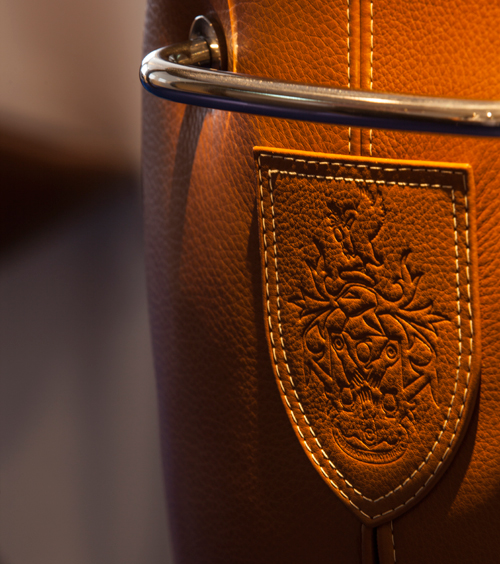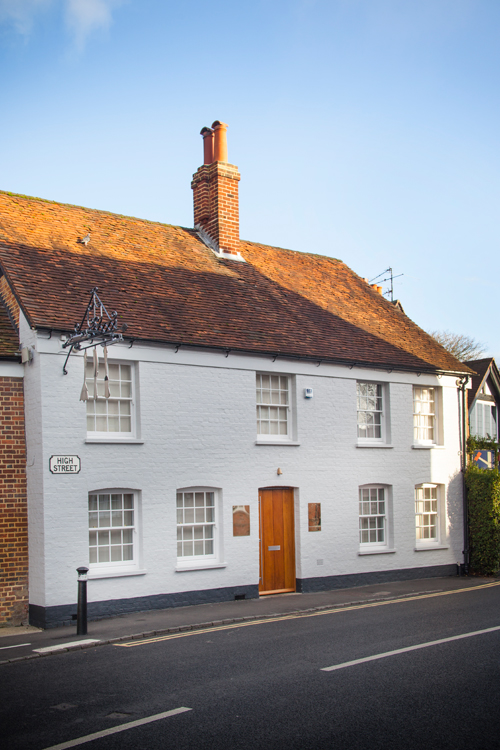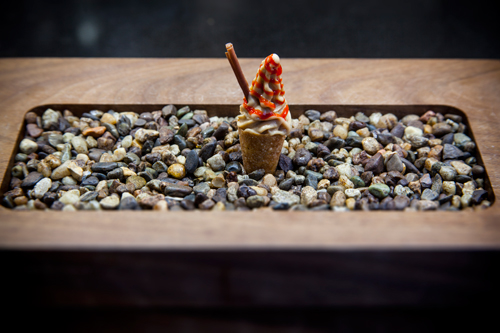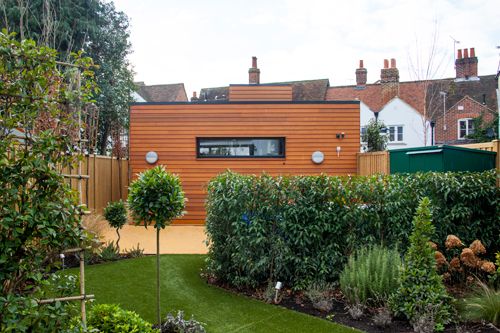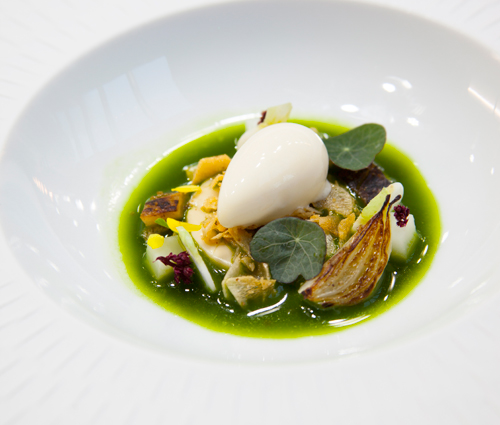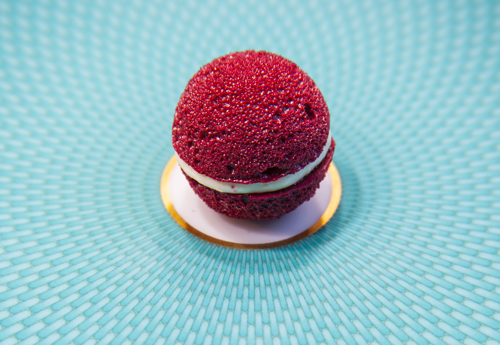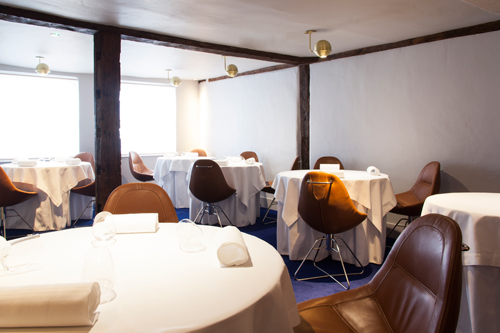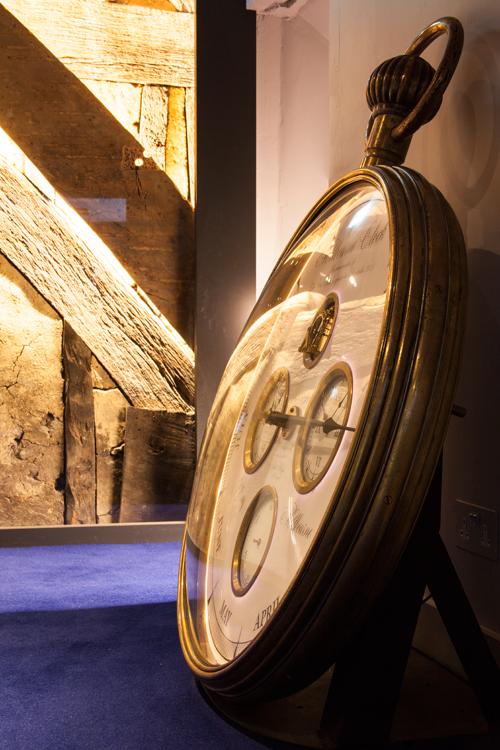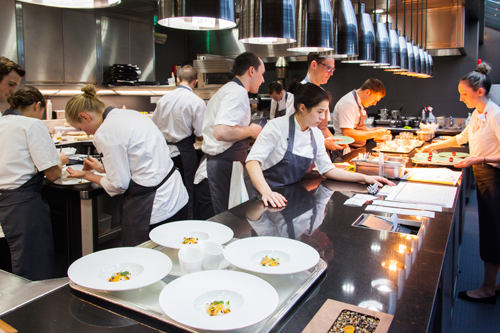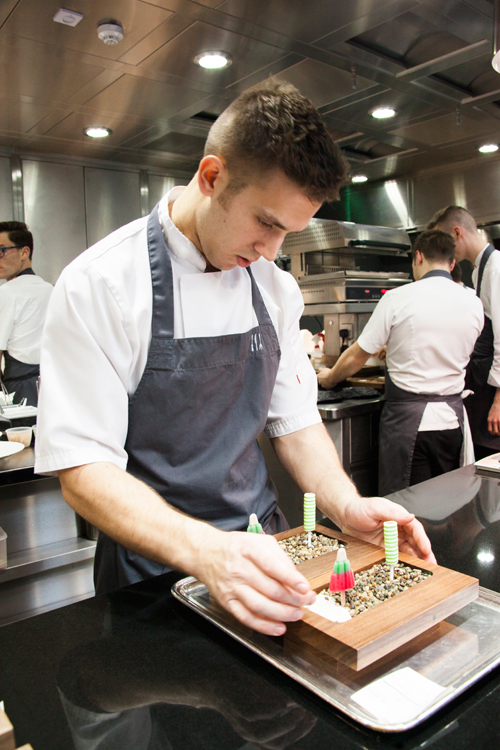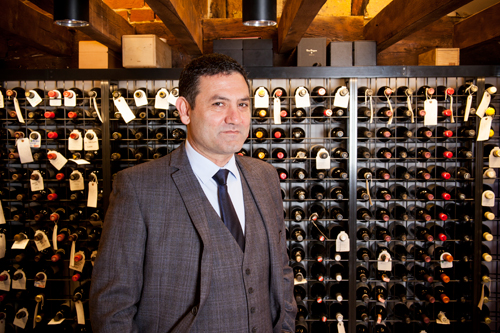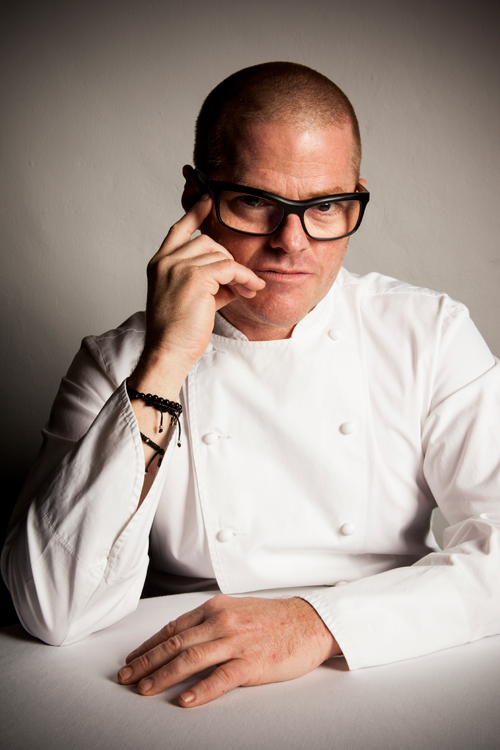Heston Blumenthal on the new experience at the reopened Fat Duck
Fiona Sims is carried away
Propped up against Heston Blumenthal's office wall is a rather grandiose bit of art. It's a coat of arms - Blumenthal's coat of arms. He applied for it after he got his OBE in 2006. "It took me six years to come up with something that works," he grins.
There's a duck on it, of course, painted in gold, and a golden apple, which represents taste and references Sir Isaac Newton and the Royal Society of Chemistry. Blumenthal has been named by the Royal Society as one of the 175 greatest chemists of all time. "I'm on the list alongside Einstein!" he says, incredulously. A sprig of lavender signifies a sense of smell and marks an epiphanous trip to L'Oustau de Baumanière in Provence, when Blumenthal was 16 years old. There are three hands, representing a sense of touch, and three Tudor roses, in a nod to Michelin. And the helmet? "That's my OBE," he says. And there has to be a motto. "Mine is 'Question everything'," he says. Of course it is.
"It tells my story," declares Britain's most original and remarkable chef, who won three Michelin stars for his restaurant, the Fat Duck, in Bray, Berkshire, at the age of 37.
The Fat Duck in 2016 is all about the story. Since Blumenthal and his team returned from Melbourne, Australia, where he famously decamped for six months while the Bray flagship underwent a £2.5m refurbishment, he has been putting the finishing touches to that story. "Only now do I feel that the Fat Duck has really started. The past 20 years has been research for the restaurant that you see now. We're just at the beginning," he declares.
Yes, there is Dinner at London's Mandarin Oriental Hyde Park, with its two Michelin stars, headed up by chef Ashley Palmer-Watts. There's Dinner in Melbourne now too, and his Bray pubs, the Hinds head and the Crown, plus the ever-expanding range of food products for Waitrose, and kitchen gadgets for Sage, and even a new TV special about revolutionising astronaut food - but it's the Fat Duck that is absorbing all of his attention right now.
This is the man who gave us snail porridge, nitro-scrambled egg and bacon ice-cream, white chocolate and caviar velouté, and salmon poached in a liquorice gel, made using techniques and ingredients that explored uncharted culinary territory - liquid nitrogen, dry ice, gellan and transglutaminase, to name a few.
It was in the 1990s that Blumenthal first conceived crab ice-cream, putting it on the tasting menu in 2000 with a crab risotto, a red pepper cassonade and passion fruit jelly - and therefore putting savoury ice-creams on the menus of top restaurants up and down the country.
"The crab ice-cream was a stepping stone for me - the first of the multi-sensory stuff. I didn't realise at the time the major impact it would have on cognitive neuroscience research, and how important it would become to the direction of my cooking, particularly after the restaurant won its third star. The very name seemed to act as a barrier. If it was called frozen crab bisque, not only was it more acceptable, it was also considered less sweet, which I found remarkable, and it got me thinking. Then I went a bit mad," he adds, with a grin.
This happened soon after Blumenthal won his first Michelin star in 1999, four years after opening the run-down pub in the village of Bray, with help from his dad and the bank, after just a couple of weeks at Belmond Le Manoir aux Quat'Saisons in Oxfordshire.
Crab and passion fruit 99
A self-taught apprenticeship
After that transforming visit to L'Oustau de Baumanière as a teenager, where he fell in love with cooking and the idea of being a chef, Blumenthal worked his way through the Michelin and Gault Millau guides and read up on the great chefs, buying their cookbooks and working his way through their recipes and later their restaurants, selling his car to fund his gastronomic excursions. He progressed to the culinary bibles Larousse Gastronomique and Escoffier's Guide Culinaire, comparing the techniques and carving out his own unconventional apprenticeship.
One book in particular stood out - Harold McGee's On Food and Cooking: The Science and Lore of the Kitchen. "There it was, in black and white, on pages 115-116: 'searing does not seal', a declaration as shocking and radical in its way as Copernicus's assertion that the earth orbits the sun," said Blumenthal, who went on to question many other basic kitchen principles, among them the cooking of green beans.
Back then, if you asked him why he didn't add salt to his green beans, he was off, talking about enzymes and chlorophyll, losing all but the most science-savvy. His questions led him, after some brazen cold-calling, to eminent scientists, some of who became pivotal figures and mentors. One such figure was Dr Peter Barham, a physicist at Bristol University.
The new kitchen extension
It was with Barham that Blumenthal first began playing with liquid nitrogen, which led eventually to his tableside nitro-poached green tea and lime mousse, which raised the bar and eyebrows globally.
Others in his inner science circle include Dr Charles Spence at the Crossmodal Research Laboratory at Oxford University, who had done a lot of work on multisensory perception. This led to Blumenthal's game-changer of a dish, 'Sound of the sea', which is one of the few dishes that has stayed on the new menu at the Fat Duck.
Blumenthal was the first chef to highlight that the eating experience is influenced not only by the food itself, but also by the way the brain processes the stimuli presented to it during eating, evoking memories and generating emotional response. The collection of nerves in the brain that governs these responses is known as the limbic system, to which Blumenthal often refers.
With help from Spence, Blumenthal discovered that oysters taste better when listening through headphones to the sound of the sea than they did when listening to clucking chickens. He also discovered the work of Nicholas Kurti, a physics professor at Oxford, whose 1969 lecture, entitled 'The Physicist in the Kitchen' marked the starting point for a renewed interest in the role of science in cooking - a eureka moment for Blumenthal.
Gazpacho of botanicals
Magic moments
More recently, his circle has moved into other areas - from a font expert, Karen Pine, who promises to mess with our brains on the menu, to a perfumer, Christophe Laudamiel, who uses smells to create an emotional response. Then there are the celebrity magicians - Chris Cox and Derren Brown - to whom Blumenthal has turned for assistance with 'nudging'.
To illustrate, Blumenthal sets four coffee cups in front of me, each with the word 'coffee' written in a different typeface on the front. The one with the more jagged type tastes more acidic, the coffee with the rounder typeface tastes fruitier. He tells me it's all the same coffee. "The more flowery and flamboyant the font, the more complicated the recipe seems. The font can alter your perception of taste. We're working on fonts for the menu," he grins.
He's just got back from a two-day thinktank at Cliveden House, where he was joined by an unlikely mix of brains. Among the gathering was a professor of evolutionary genetics, Mark Thomas, which prompts an entertaining ramble from Blumenthal about chimp brains and reward mechanisms. Richard Seymour, a designer of the Wonderbra, who developed Blumenthal's sweet shop-cum-doll's house for the restaurant, and Matthew Syed, author of Black Box Thinking (a book about embracing failure), who fired up Blumenthal to such an extent that he now talks about opening another restaurant as a training ground where staff are encouraged to fail. "Failure is an opportunity to learn," he says.
Jonny Lake, head chef at the Fat Duck, with Blumenthal and his ‘Like a kid in a sweetshop' - the petits fours trolley
"But if I have to have one mentor, then it's Tony Blake at Firmenich. My investigative treasure hunt really started here," says Blumenthal of the retired scientist at the Swiss flavour manufacturer.
The regular visits to Firmenich became a forum for ideas. It was there that Blumenthal and his chefs met Professor Don Mottram, who works at the School of Food Biosciences at Reading University, not far from the Fat Duck.
After several enlightening discussions about reactive flavours, the chefs at the Fat Duck started collaborating with Mottram's PhD students to explore a wide range of topics, from the characteristics of aged syrup to the volatile components of Jack Daniel's (which featured in his BBC TV series In Search of Perfection).
As well as pushing perceptions of food, both at home and in the industry, Blumenthal has brought the past to the present in dramatic style, taking inspiration from Britain's rich culinary heritage.
He was the first chef to gain access to the kitchen archives at Hampton Court, where he hooked up with its historians, Marc Meltonville and Richard Fitch. Along with food historian Ivan Day, they went beyond their usual painstaking reproduction of recipes and helped Blumenthal to create recipes - his starting point was the end of the 14th century.
Cue 'Meat fruit' - the star dish at Dinner, inspired by a recipe from 1430. The authentic pockmarking on the chicken-liver 'mandarin' was discovered by accident. 'Quaking pudding' - the first historical recipe he ever worked on, satisfied his quest to find the perfect wobble.
'Mock turtle soup', also made the headlines, growing out of his continuing obsession with Alice's Adventures in Wonderland. Some of the dishes were served at the Fat Duck ('Mock turtle soup' is still on the menu), others are on the menu at the Hind's Head, and all the dishes at Dinner have an historical element to them.
A change of air
So which dishes have stayed at the Fat Duck, and which have gone? One of the most irritating questions Blumenthal has had to deal with over the years is 'when is the menu changing?' The restaurant's name might be the same, but the dishes often went through 10 different versions before arriving on the menu.
His first signature dish, 'Crab biscuit, roast foie gras and oyster vinaigrette', in 1998, stayed on the menu for several years. It was a testing ground for all manner of techniques and ingredients and snippets of food science Blumenthal had picked up.
"The dishes that build the Duck are the ones that have evolved like a journey; they are a narrative. And when a dish can't be evolved any more, then we take it off the menu," he explains.
"When the Fat Duck moved to Australia, I realised I wouldn't get another chance to try and give myself some headspace; to look back at the last few years at the essence of the Duck. There's a thing called the incubation period in creativity. It can last for a long time, and you can be missing bits - but you don't know what you are missing. So here was a chance to question what we were doing. It's been a long, hard process and trying to explain it all to our development team, well, sometimes I felt like I was talking Turkish," he says.
For the past 15 years Blumenthal has turned to psychologist Mike Duckett in an effort to order his chaotic brain, along with a daily dose of mindfulness, which helps to keep him focused and which he recommends.
"Mike asks me questions, like, what do you want people to feel when they leave the Duck? And I say, curiosity, discovery, adventure, playfulness - ultimately leading to happiness. How do I do that? Through nostalgic triggers," he declares. And the new menu is packed with nostalgic triggers, especially from the 1970s.
So what's next for Blumenthal? "I'm going to rewrite every recipe we've ever done with the knowledge that we've gained over the years," he reveals. Plus he's helping to rewrite the GCSE on food and nutrition to include a sensory element. And then there's that TV show on astronaut food, a one-and-a-half hour special airing next month on Channel 4, which will see him undertake basic space training.
"Am I happy? It sounds like a cliché, but I'm happier than I've ever been before - I feel 20 years younger. My brain used to be a tumble-drier of stuff. I felt like I was this jigsaw puzzle with loads of bits missing, but now I have more clarity than I've ever had and I can express myself better than I've ever done before.
"And I have a story to tell - everything I've done is about telling a story, from the Fat Duck Cookbook to Feast, from Historical Heston to In Search of Perfection. It's what I do," he grins, before his team swallow him up for an afternoon of meetings.
The bumpy road to stardom
Many of us have forgotten about the struggle that Blumenthal had financially, right up until he got his third Michelin star in 2004.
"On the day I heard that we'd received it, there were just two tables booked in for dinner and we were two days away from bankruptcy," remembers Blumenthal with a shudder. "But if that hadn't happened, I wouldn't be where I am today."
The financial meltdown was due to a combination of factors, not helped by the opening in 2001 of the more informal Riverside Brasserie, that proved to be a drain on his finances. It needed highly trained staff for its labour-intensive menu, and that, combined with the vagaries of its seasonal waterside location, meant the figures didn't add up, so he parted ways with it in 2004.
Winning a second star at the Fat Duck in 2002 brought with it a different set of responsibilities - not least the less than conventional approach to food. The restaurant was rammed at the weekend, but sometimes virtually empty mid-week - a situation that continued up until he received the third star.
Blumenthal pushed the money worries aside and prepared to wow his contemporaries at prestigious gastronomy congress Madrid Fusion, rolling out the water bath, desiccator and liquid nitrogen, and letting the international audience taste his mind-bending beetroot blackcurrant pastels. The press went wild. Then, while he was there, news hit of the Fat Duck's third Michelin star. The phones started ringing and haven't stopped.
The menu at the Fat Duck
Nostalgia is key to the new menu at the Fat Duck. In fact, Blumenthal doesn't call it a menu - it's a map. "It's a story of a day's holiday. Right now, I'm using memories of my own childhood holidays in Cornwall, but diners can unpack their own memories over the course of the dinner," he explains.
Blumenthal turned to food-loving Billy Elliot scriptwriter Lee Hall to help out. "We laid out all the dishes in front of him and he concluded that what we had was a story of a holiday, or a great day out as a kid, so we started from there," explains Blumenthal.
Only four dishes from the old menu remain - the 'Sound of the sea', 'Mock turtle soup', 'Botrytis cinerea' and the whisky gums. Everything else is new, at a cost of £255 per person - and just to be clear, there is no Á la carte menu.
"The new dishes were almost the easy bit," says head chef Jonny Lake, who has been working at the Fat Duck for over 10 years. "The hardest part has been getting front of house to get their heads around the whole concept. It's not the classical way of serving food - there's more engagement with guests at the table.
"When Heston was explaining the concept to the staff, he told them: 'We are not a restaurant any more'," explains Lake.
The 'map' (menu) is handed to guests in the darkened entrance lobby, where a hologram keeps them entertained while waiting to be escorted to their table.
It tells of a trip, 'inspired by some of my favourite childhood holiday memories', writes Blumenthal. A magnifying glass is provided to better read the details of the dishes.
The first part of your 'itinerary' is 'The day before we go: are we nearly there yet?' Three dishes arrive in quick succession. 'A change of air' - an aerated beetroot macaroon which disappears on the tongue in a puff of earthy flavours - followed by a thrilling 'Gazpacho of botanicals' - smoked cumin royale, Jerusalem artichoke ice-cream and dragon-breath inducing 'nitro-poached cocktails'. These are prepared at the table, with a choice of a paloma, Campari soda, piÁ±a colada or a vodka and tonic.
The next part of the itinerary is 'Morning: rise and shine, it's breakfast time', which kicks off with 'Excuse me, there seems to be a rabbit in my tea' - an intense hot and cold velouté of rabbit with tarragon and mustard. Then, 'Why do I have to choose between a variety pack and a full English?' - umami-rich layers of truffle egg mousse, jellied tomato consommé, bacon, toasted bread cream and cereals, which we scatter over the dish ourselves.
This marks the first of the personalisation elements of the menu. We each choose a box of cereal from the variety pack. I'm steered towards the 'Queen Flakes', which opens to reveal a jigsaw puzzle, which we're instructed to build at the table. It's a moneybox (a 'coin' for it arrives later, to be exchanged at the sweet shop) and on one side is an image of Daniel Craig, much to my delight. The team had elicited this info - my weakness for the Bond actor - from my website.
Later in the meal I also receive a postcard with a picture of my favourite beach - information also gleaned from my website. Judging by the reaction on other tables, emotions are running similarly high; just what Blumenthal wants.
Blumenthal's now-legendary 'Sound of the sea' dish starts the next section, 'Mid morning: first one to see the sea', and this new incarnation comes with cured yellowtail and mackerel, plus steamed octopus, sitting on its trademark tapioca 'sand', munched to a soundtrack of crashing waves.
This is followed by 'Classic savoury ices' - Waldorf salad, 'Rocket' with walnut, celery and grape, and 'Twister': salmon and jasmine tea pearls, avocado mousse with lemon and horseradish cream.
Finally, the 'Cornish crab' dish, which brings back a familiar Fat Duck pairing of caviar and white chocolate, delivered in a 'rockpool' shaped dish - smoked caviar and golden trout roe, velouté of white chocolate and sea vegetables.
We're halfway through now and it's the 'Afternoon' of our journey, titled 'If you go down to the woods today…'. This starts with a dish called 'Damping through the Boroughgroves' which is a forest floor of mushrooms, beet and blackberry, scented with fig leaf, meadowsweet, meliot, oakmoss and black truffle. This is followed by 'Mock turtle picnic', complete with melting fob watch, mock turtle soup and egg, and a toast sandwich.
We're moving into the evening part of our journey now and the lights over our table change (something Blumenthal wants to play with more in future). This is the table d'hote bit of the menu - a three-course dinner in miniature, circa 1975, or rather the essence of one, starting with Blumenthal's take on prawn cocktail - poached and hot langoustine, shiitake mushroom, kombu, birch syrup cocktail sauce and Little Gem. This is followed by 'Duck a l'orange', water-bathed with blood pudding, green coffee and chicory. There's a cheese and grapes reference, too, in the 'Botrytis cinerea' - saffron, fenugreek, citrus, Roquefort, chocolate and pear, and whisky gums to finish.
The lighting dims once more and we're now suffused in a cosy, orange, night-light glow, prompting yawns all round.
Waldorf salad, ‘Rocket' with walnut, celery and grape, and ‘Twister'
A 'cloud' arrives with a pillow on top - this is 'Counting sheep', marking 'Bedtime - off to the land of nod', our penultimate course, an all-white assembly of double-milk ice and meringue, coconut ice-cream, steamed sponge and milk panna cotta.
'And then to dream' is our final course, called 'Like a kid in a sweetshop'. The petits fours trolley is an automaton with a traditional sweetshop frontage and a doll's house concealed within, complete with a faithful replication of Blumenthal's boyhood bedroom, and a chimney puffing smoke rings (you have to be there). The cost? £150,000.
The choice of petit fours that you choose will be personalised in future - how, Blumenthal isn't saying, but this is where advice from magicians Derren Brown and Chris Cox comes in, and a range of auto-suggestion techniques are currently being worked on.
"I want to take the sound element even further," promises Blumenthal. "'Sound of the sea' made me realise that we've got to start personalising. I don't mean customising a menu for each diner, but there's stuff we can do on the day. People will be able to choose their own soundscape."
Blumenthal has also bought the rights to Gene Wilder's 'Pure Imagination' from the movie Willy Wonka and the Chocolate Factory - though he's not sure yet where guests will hear it. "Imagination is more important than knowledge," he declares, quoting Einstein.
Wine at the Fat Duck
Where do you start when matching wine to the food at the Fat Duck? "I think our food is actually the easiest to match - the flavours are very precise and always clean," declares the Fat Duck's long-serving head sommelier Isa Bal.
"I like to take people out of their comfort zone. My aim is to surprise - it doesn't have to be wine, either," he adds.
Head sommelier Isa Bal
Indeed, the 10-strong wine pairing menu at the Fat Duck, which costs £155 per person and is chosen by a third of the guests, includes a classic martini, to pair with the 'Gazpacho of botanicals' and a junmai daiginjo sake for 'Sound of the sea'. Another third order wine by the bottle.
For this, Bal leads guests to the smart new first-floor cellar, where they can pluck their chosen bottle from the 750-bin list, while the final third choose from the daily changing by the glass selection and soft drinks - fresh juice is a big thing here.
"If I had to choose one bottle of wine, then I suggest choosing something you like that is high quality - but that doesn't mean expensive. It won't go with every dish, but you don't need to think too much about it. I say, just enjoy the wine," says Bal, who promises that he will open pretty much anything to serve by the glass, thanks to his Coravin wine preservation system.



